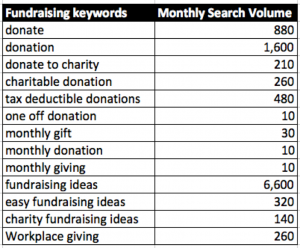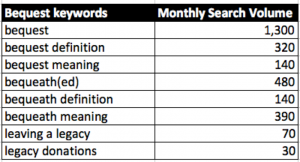This article was first published in F&P Magazine
 I don’t know where I was when I first heard the term “Content is King”, but it was around circa 2007 when I had already been a digital marketer for about 3-4 years. In recent years I’ve seen the expression expand into “If content is king then distribution is God almighty” – and Google is arguably the world’s largest distribution network.
I don’t know where I was when I first heard the term “Content is King”, but it was around circa 2007 when I had already been a digital marketer for about 3-4 years. In recent years I’ve seen the expression expand into “If content is king then distribution is God almighty” – and Google is arguably the world’s largest distribution network.
I absolutely believe with every being of my soul that you, me, we, every brand and organisation needs to tell a great story if we are going to have true engagement with our supporters and donors. It is also true that our content can and should educate and inspire and enrage and urge people into action.
We live in a world where any intellectual dispute ends with the challenge, “Google it!” It is at this point that your content strategy needs to take on a scientific angle and invest in Search Engine Optimisation (SEO) strategies.
Because what your organisation wants to say and what enquiring minds type into Google when looking for the very same information, is different.
It’s not common sense, its data-driven
Knowing what people type into Google when they’re looking for information is not about using common sense or even plain-speak, because there are many ways to say the same thing.
As a digital marketer and fundraiser, it’s my job to know how people behave online. Sure, I have 12 years’ experience that has taught me a lot, but I also can access data  that shows me in exact terms what people type, click, roll-over, look at and what they start or complete.
that shows me in exact terms what people type, click, roll-over, look at and what they start or complete.
When developing content strategies for my charity clients, the first thing I do is search engine keyword research. I have recently implemented website and digital content strategies for White Ribbon and Surf Life Saving, and from past projects I can tell you the results we saw for the Nature Conservation Trust and WWF when we approached digital content from a scientific point of view.
What can SEO deliver?
The first thing a digital content strategy can deliver is more relevant visitors to your website – specifically, people who are already looking for the information that you can provide.
After redesigning website content for what people are actually looking for, the Nature Conservation Trust saw a 96% uplift in website visitors from Google in the first year (2012) as well as a 120% increase in donations. Two years later in 2014, there had been a 400% increase in website visitors, when compared to 2011 when the work began. That’s an increase from 3,000 visitors a month to 19,000. As a result, their donations increased in line with the traffic.
What is keyword research?
Using keyword planning tools – some free and some paid – I am able to see exactly what words (known as “keywords”) people type into Google when searching for information. I can drill down into how people search across different countries (say Australia versus America) as well as individual states within a country.
 To give you a cultural example – in Australia we use the term “not for profit” when referring to charity or non-government organisations, but in the USA they prefer the simpler version of “non profit” – then there are the nuances of with or without hyphens or spaces. These tools can also tell me exactly how many searches there are for any given term on a monthly basis.
To give you a cultural example – in Australia we use the term “not for profit” when referring to charity or non-government organisations, but in the USA they prefer the simpler version of “non profit” – then there are the nuances of with or without hyphens or spaces. These tools can also tell me exactly how many searches there are for any given term on a monthly basis.
SEO Keyword Research allows me to make recommendations to my clients as to what keywords they should target so as to achieve their awareness, engagement or fundraising goals.
Quantity versus Quality
As Google is an undeniably huge distribution network, it’s potential to drive large volumes of supporters to your organisation is massive. But maybe your strategy is to go niche, to go for a slightly more educated group, rather than the masses? Your keyword research should guide your strategic decisions, not just indicate the largest group of people to target.
Keywords can be illustrated in a funnel diagram as well – the more generic (and usually shorter) the term people type into a search engine, the earlier they are in the thinking/ research process. As the keywords get more specific (and usually longer), the person searching for information has more knowledge and is further into their consideration cycle.
Communications and language
As marketers and fundraisers in the not-for-profit sector, we work within highly intellectual organisations. On a daily basis, we work with scientists, medical professionals and people who influence service providers and government policy advisors. Our ability to communicate our cause clearly to supporters and donors can sometimes be hampered by technical language and the need for absolute accuracy. This is a well-known challenge in our space and one that I come up against often.
I am often able to win some of these little battles because of my access to data that scientists and medical professionals respond well too.
At WWF, for example, we wanted to use the term “endangered animals” because it is the term that the average person understood when speaking about animals under threat of extinction. The correct term is “threatened species” and for a long time fundraisers had been shot down and were not allowed to use the incorrect term. When I was able to show the opportunity we were missing (to engage with people who cared) by not using the more common term – we got a yes. Because scientists respond to data.
For White Ribbon – the sector has been moving towards using the word “domestic abuse” rather than “domestic violence”. After looking at the data, they decided to continue to use “Domestic Violence”, but to introduce the term “domestic abuse” so that as the media and community shifted slowly to this new language, White Ribbon would be well placed to be found online.
Fundraising keywords
For fundraisers at every organisation, you need to know how the terms we use everyday as our internal language are known or not by our donors.
For instance:
- bequest vs. bequeath
- donate vs. donation
- monthly donation vs. monthly gift (the search volume is very low for both)
- charity vs. not-for-profit
- fundraising ideas vs. easy fundraising ideas.
Here are some examples of the monthly searches generic fundraising terms get (when not attached to a brand).
Before you invest time and energy in creating beautiful online content, choose your keywords carefully. As you can see, the opportunity to reach your audience will be greatly improved.
Happy keyword hunting.




